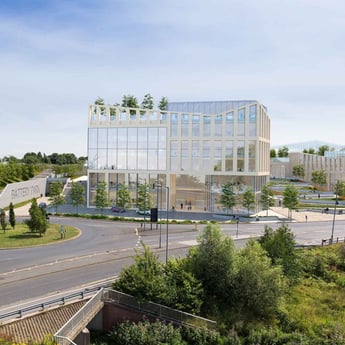Science parks as economic drivers

Avison Young's Carl Potter takes a look at how knowledge and tech sectors will create a re-fuelling of demand for science parks
Whilst the expansion of financial, business and professional services has fuelled the growth of most Regional City CBDs over the past 2- 3 decades (post 1986 - Big Bang) and more recently the public sector (and associated need to push jobs out of Whitehall) has led to levels of take up in the UK’s core regional cities being well above average, there is an increasing expectation that tomorrows’ occupiers will look different and have different demands and expectations.
Whether or not Brexit delivers a solution more favourable to manufacturing than to services (or less favourable to all), it is our view that there will be a slow but sure demise in the ever increasing demand from the traditional growth sectors (as automation takes it tolls on overall jobs growth) and a re-fuelling of demand from the media/tech/digital and science sectors.
But what will that look like and how will it manifest itself?
Historically, it has to be remembered that prime office rents were only supported by premium occupiers (accountants, lawyers, front of house banking services etc – and when they were feeling particularly brave or foolhardy – commercial property consultants) and the tone of development was vanilla grade A. But the rise of the design focussed tech generation has fuelled demand from a much broader selection of sectors, that are both adding value to and growing our regional economies. These companies want quality space but different, and quality locations but different and have begun to spread the reliance away from the traditional prime payers and locations.
In a London context think Google at Kings Cross and Apple at Battersea.
This activity is also manifesting itself in a move of the brains to an altogether more exciting future – and with the City of London and Finance sector no longer being the only game in town, the UK’s regional cities are being considered as a great fit for the expanding cohort of entrepreneurs that the UK will need in a post Brexit world to ensure our growth needs can be met. Feeding this demand into the emerging changes in spacial needs ( co-working/flexible/agile workspace) and a growing selection of tenure options ( flexi/club/sponsored space) the ability to provide occupiers with an ecosystem within which their business can grow has never been more important. If bricks and mortar is all that is on the table, the solution is not going to meet these expectations, whereas the true holistic spatial offer providing access to collaboration and enabling convergence of technologies and services across a spectrum of industries will win through.
Nowhere is this more recognised than within the science park sector that has well supported the growth of the UK’s knowledge economy and now plays an increasing role in the evolution of the office offering – providing the right mix of flexible terms, usable accommodation, business services and a collaborative approach to working alongside like-minded occupiers.
Think not where you should be developing but how.
